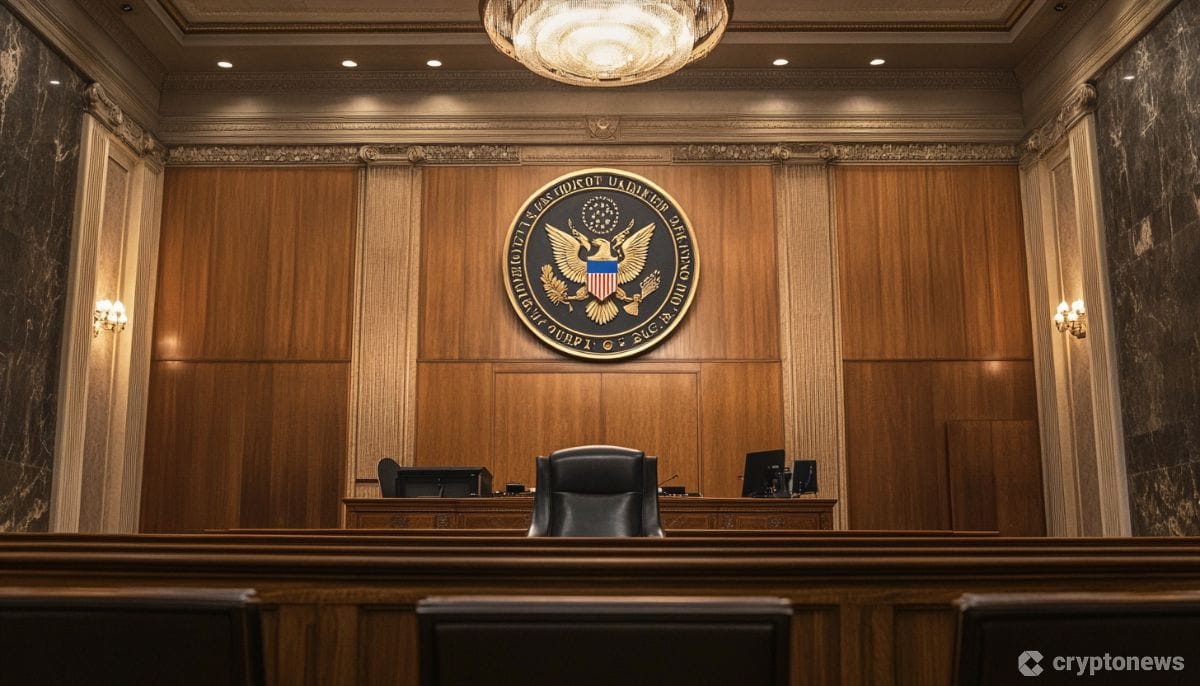Last updated:
 Why Trust Cryptonews
Why Trust Cryptonews

Coinbase and several of its top executives have been named in a shareholder lawsuit that alleges they misled investors about bankruptcy risks and engaged in risky proprietary trading practices.
According to a lawsuit filed on February 18 in a New Jersey federal court by Coinbase shareholder Wenduo Guo, the lawsuit claims that the company failed to disclose that customer assets could be considered part of its bankruptcy estate, leaving retail customers as unsecured creditors.
Coinbase Hit With Another Lawsuit: What Is Happening?
The lawsuit alleged that Coinbase’s public statements misrepresented the security of customer funds, particularly in light of previous cryptocurrency exchange collapses.
Guo’s filing references the collapse of over 75 cryptocurrency exchanges before Coinbase’s public listing in April 2021, which left affected customers unable to recover their digital assets.
Despite assurances from company leadership, the lawsuit claims that Coinbase did not provide any additional safeguards to protect customers from similar risks.
The complaint also references the U.S. Securities and Exchange Commission’s (SEC) ongoing lawsuit against Coinbase for allegedly listing unregistered securities and operating without proper regulatory approval.
The lawsuit seeks damages and corporate governance reforms. It names key executives such as Coinbase CEO Brian Armstrong, co-founder Fred Ehrsam, CFO Alesia Haas, COO Emilie Choi, and Chief Legal Officer Paul Grewal. Several board members, including Mark Andreessen and Fred Wilson, are also implicated.
According to the complaint, the company’s filings failed to highlight that customer assets could be included in its bankruptcy estate, a fact that would make retail customers unsecured creditors in the event of insolvency.
The lawsuit argues that Coinbase misrepresented the security of customer funds, creating a false sense of confidence among investors.
In addition to bankruptcy concerns, the lawsuit accuses Coinbase of engaging in undisclosed proprietary trading to offset declining crypto prices, further exposing investors to risks.
The suit alleges that the company used its funds to trade digital assets, which could have increased market instability and exposed investors to even greater risks.
Guo contends that these actions were meant to compensate for declining crypto prices but instead exposed Coinbase to heightened financial risks.
You might also like
As of now, Coinbase has not issued an official response. Meanwhile, the exchange is also facing additional securities-related lawsuits, including a revived class-action suit in New York.
Regulatory Challenges and Additional Lawsuits
The shareholder lawsuit also connects Coinbase’s legal troubles to the SEC’s ongoing case against the company.
In June 2023, the SEC sued Coinbase for listing unregistered securities and failing to register as a broker-dealer.
The shareholder suit argues that these regulatory issues were known internally but not adequately disclosed to investors.
Beyond the latest lawsuit, Coinbase is also fighting multiple securities-related class-action cases. In New York, a judge recently ruled that the exchange must face a revived lawsuit accusing it of illegally selling unregistered securities.
Plaintiffs in California and Florida have filed similar complaints, targeting specific tokens such as Solana, Polygon, Near Protocol, Decentraland, and Algorand.
Despite these mounting legal challenges, Coinbase reported strong Q4 2024 earnings, with a 138% revenue surge compared to the previous year.
The company reported a net income of $1.3 billion, significantly higher than the $273 million it earned the previous year.
This surge is attributed to Donald Trump’s pro-crypto stance, including appointing cryptocurrency advocates like Paul Atkins to key regulatory positions, contrasting with former SEC Chair Gary Gensler’s stricter approach.
However, the SEC has requested an additional 28 days to respond to Coinbase’s appeal, and the legal battles surrounding the exchange show no signs of abating.



